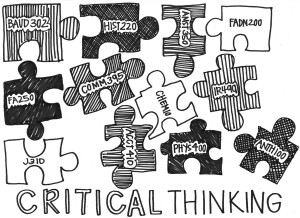Critical thinking proves essential
The link between the concept of behavioral economics and college students is critical thinking, the ability to gather relevant information from different fields of study to help us make a rational decision.
Christina Ellis | Daily Trojan
While most universities include critical thinking in their mission statements, it is essential for USC to provide more opportunities for students to improve their critical thinking and to carry those skills over into the professional world.
Economic theories are mostly built upon the assumption that people act rationally in their own self-interest. Economists have never pretended that they can predict individual behavior, but economic theories do a pretty good job of predicting how groups of people will act. Even Adam Smith’s “invisible hand” theory is predicated upon the idea that markets are controlled by people acting in their own self-interest.
Professor Fernando Zapatero, the inaugural holder of the Robert G. Kirby Chair in Behavioral Finance, teaches behavioral finance classes at the Marshall School of Business. To find the connection between behavioral economics and our everyday life, I interviewed Zapatero. He cited a specific example to explain how the Japanese have used knowledge of behavioral economics to analyze a financial market and help people make investment decisions. Japan is an aging country, and aging issues affect the country’s economy, saving mechanisms, price and investment products.
As a result, by analyzing people’s motivations, many Japanese businessmen and technicians worked together and developed robotics to help improve senior care.
Zapatero has noticed that many of his students were able to solve complicated financial models like the Capital Asset Pricing Model, a model that describes the relationship between risk and expected return. But Zapatero has also noticed they are unable to explain some economic failures, such as the European economic crisis.
“The world is moving fast today, and students need to learn critical thinking skills to help them predict and understand how things are going to change and adjust situations correspondingly,” Zapatero said.
It only takes about 20 minutes in a shopping mall during a sales season, however, to dispel any notion that buying behavior is rational.
In Models of Man, Herbert Simon, Nobel Prize-winning economist, explains that people operate in an environment of “bounded rationality,” which means we never have perfect information and our behavior is therefore based on doing the best we can with what we know. He calls this phenomenon “satisficing.” But even when we have good information, we still act irrationally in some situations.
One of the puzzles that behavioral economics could help solve is what motivates people to make irrational decisions, by combining economics with the knowledge of other academic fields. Academic fields, such as anthropology and psychology, build a necessary bridge between traditional economic theories and real life human factors, both of which are key in the decision making processes.
Similar to many other business schools, Marshall places a strong emphasis on a number-based education.
Zapatero commented that many students would like more space in their class schedules to take classes outside their majors to expand their fields of study and have more opportunities to develop their critical thinking.
Faced with a global economy, driven by information and technology, one has to be able to deal with changes quickly and effectively.
The new economy places increasing demands on students’ ability to critically and creatively think as they head into a constantly evolving and increasingly competitive job market.
At the end of the day, it is crucial to realize that there is a gap between what we learn at school and the constantly changing job environment. Critical thinking skills would help us fill in the gap between the classroom and the real world and, thus, enable us to think well and solve problems systematically.
Therefore, students should have more options on campus to improve their critical thinking skills, which would be beneficial for their future study and career.
Emily Wang is a sophomore majoring in business administration. Her column “Business Matters” runs Tuesdays.

